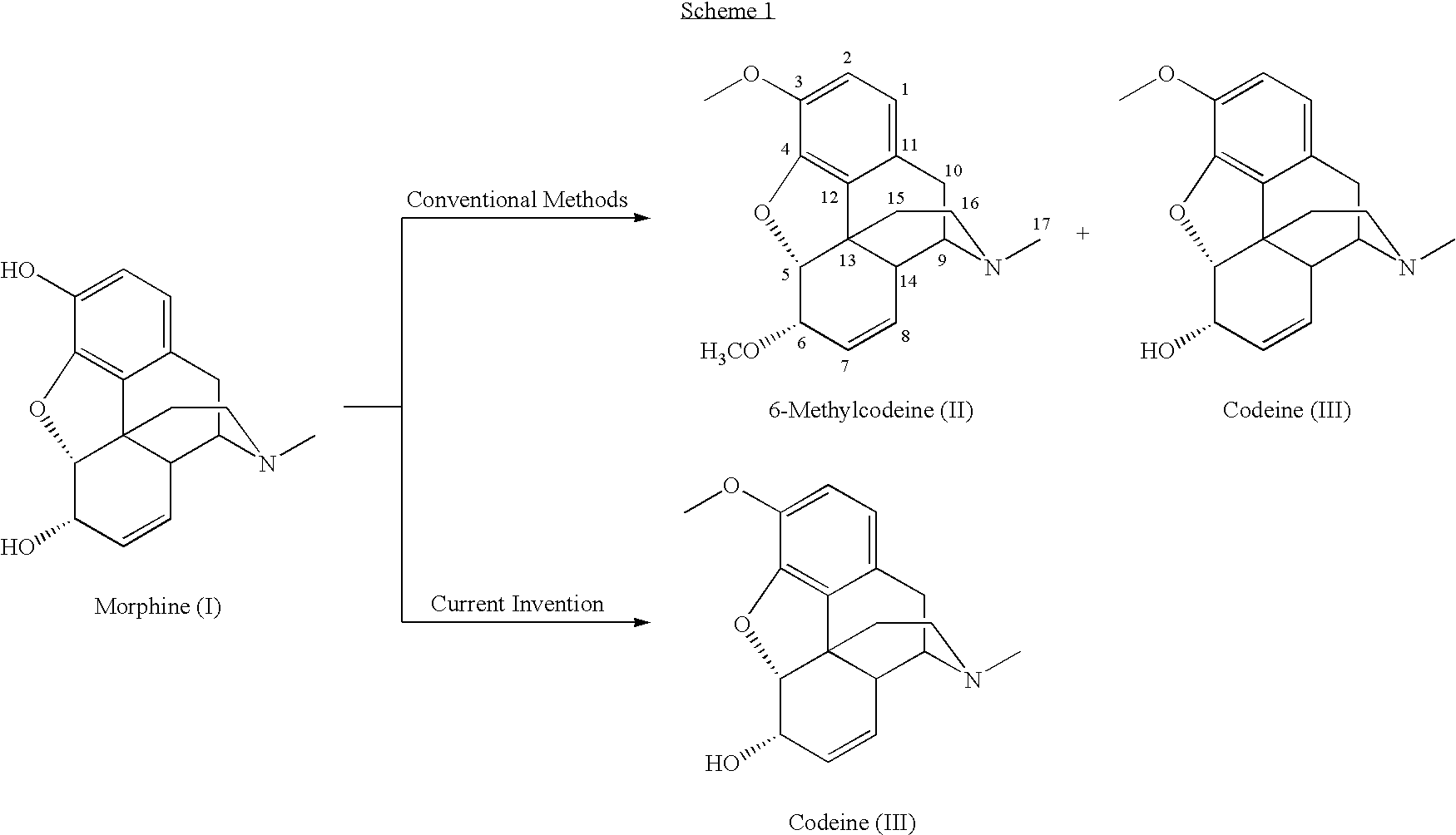Process for the production of opiates
a technology for opiates and opiates, applied in the field of opiates production, can solve the problems of limited value of quaternary ammonium species, limited quantity of codeine available from natural sources such as opium and poppy straw, and limited commercial value of codein
- Summary
- Abstract
- Description
- Claims
- Application Information
AI Technical Summary
Problems solved by technology
Method used
Image
Examples
example 1
[0046]A 1 L three-neck round bottom flask is charged with 9.980 g of morphine alkaloid purified and 500.0 g of toluene. The reaction flask is equipped with a mechanical stirrer, a thermometer, a Dean-Stark trap, a water condenser, an inlet and an outlet for nitrogen. A temperature controller (i2R, Therm-O-Watch brand) coupled with an Aldrich Instatherm oil bath is used to control the reaction temperature. The toluene suspension is stirred mechanically and dried azeotropically at 90–115° C. for 1 hour. The suspension is cooled to 50–60° C., 5.973 g of phenyltrimethylammonium chloride and 131.755 g of potassium hydrogen carbonate are charged. The contents of the flask are stirred mechanically and the suspension is refluxed between 105–115° C. for 28 hours.
[0047]The reaction is cooled to room temperature and into this solution is charged 1.000 g of activated carbon (charcoal) and the contents are stirred mechanically at room temperature. The black suspension is filtered using a sintere...
example 2
[0053]A 1 L three-neck round bottom flask is charged with 9.975 g of morphine alkaloid purified and 500.0 g of toluene. The reaction flask is equipped with a mechanical stirrer, a thermometer, a water condenser, an inlet and an outlet for nitrogen. A temperature controller (i2R, Therm-O-Watch brand) coupled with an Aldrich Instatherm oil bath is used to control the reaction temperature. The toluene suspension is stirred mechanically and refluxed at 90–115° C. for 1 hour. The suspension is cooled to 50–60° C., 6.151 g of phenyltrimethylammonium chloride and 19.850 g of potassium hydrogen carbonate are charged. The contents of the flask are stirred mechanically and the suspension is refluxed between 105–115° C. for 8 hours.
[0054]The reaction is cooled to room temperature and into this solution is charged 1 g of activated carbon (charcoal) and the contents are stirred mechanically at room temperature. The black suspension is filtered using a sintered glass funnel over a bed of diatomac...
example 3
[0056]A 500 ml three-neck round-bottom flask is charged with 10.20 g of a concentrate of poppy straw having morphine content of 80.8 wt. %, 425 g of toluene. The reaction flask is equipped with a mechanical stirrer, a thermometer, a Dean-Stark trap, a water condenser, an inlet and an outlet for nitrogen. A temperature controller (i2R, Therm-O-Watch brand) coupled with an Aldrich Instatherm oil bath is used to control the reaction temperature. The toluene suspension is stirred mechanically and dried azeotropically at 90–115° C. for 1 hour. The suspension is cooled to 50–60° C., 6.010 g of phenyltrimethylammonium chloride and 9.720 g of sodium hydrogencarbonate are charged. The contents of the flask are stirred mechanically and the suspension is refluxed between 105–115° C. for 48 hours. The reaction mixture is worked up and purified as stated in Example 1 to obtain codeine free base in a 84% yield.
PUM
| Property | Measurement | Unit |
|---|---|---|
| concentration | aaaaa | aaaaa |
| temperature | aaaaa | aaaaa |
| temperature | aaaaa | aaaaa |
Abstract
Description
Claims
Application Information
 Login to View More
Login to View More - R&D
- Intellectual Property
- Life Sciences
- Materials
- Tech Scout
- Unparalleled Data Quality
- Higher Quality Content
- 60% Fewer Hallucinations
Browse by: Latest US Patents, China's latest patents, Technical Efficacy Thesaurus, Application Domain, Technology Topic, Popular Technical Reports.
© 2025 PatSnap. All rights reserved.Legal|Privacy policy|Modern Slavery Act Transparency Statement|Sitemap|About US| Contact US: help@patsnap.com

